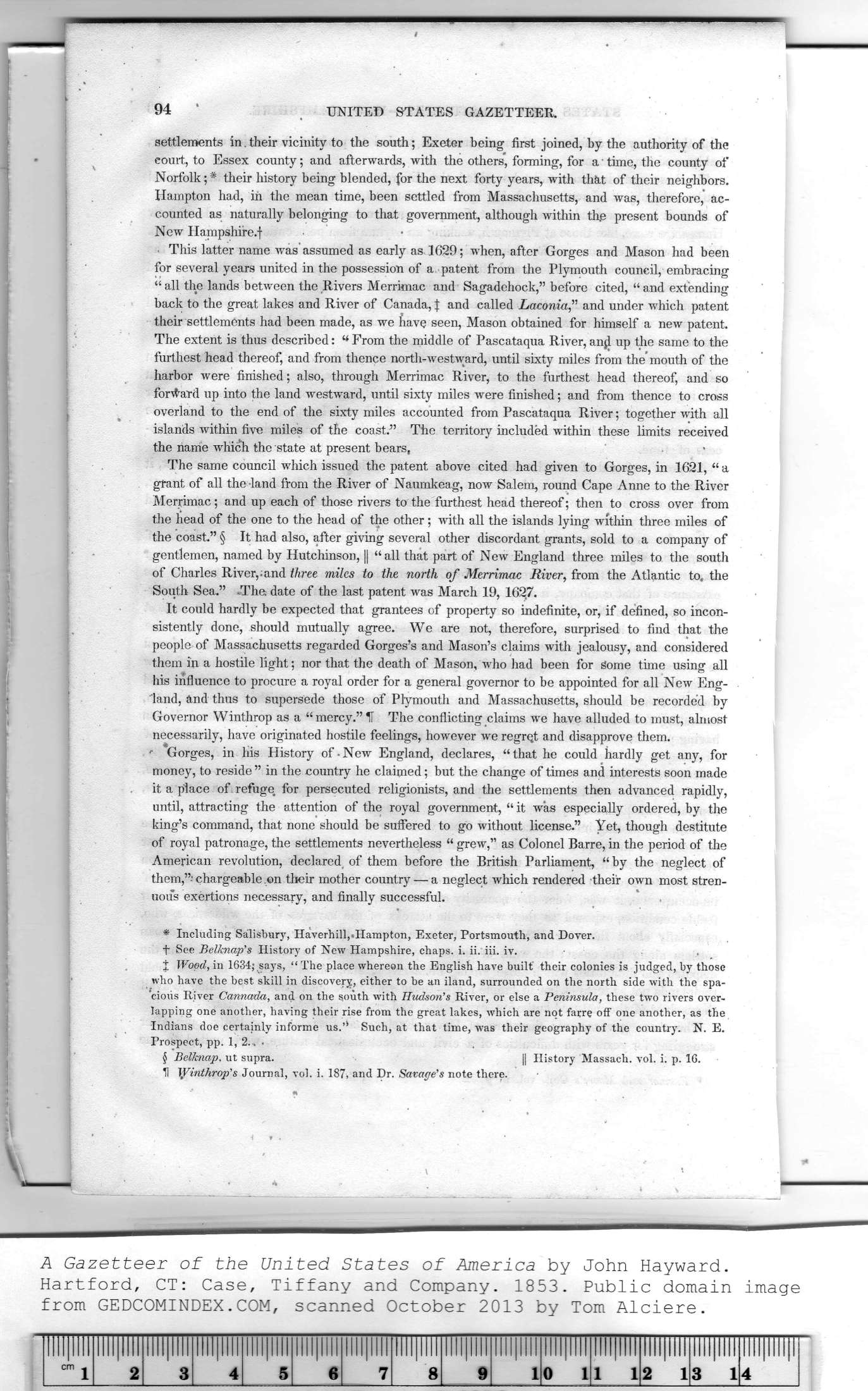|
|
Note: Ctrl and + increases the font size of the text below, Ctrl and - decreases it, and Ctrl and 0 resets it to default size.
94 UNITED STATES GAZETTEER.
settlements in.their vicinity to the south; Exeter being first joined, by the authority of the
court, to Essex county; and afterwards, with the others, forming, for a • time, the county of
Norfolk;* their history being blended, for the next forty years, with that of their neighbors.
Hampton had, in the mean time, been settled from Massachusetts, and was, therefore, ac-
counted as naturally belonging to that government, although within the present bounds of
New Hanipshire.f
• This latter name wras assumed as early as 1629; when, after Gorges and Mason had been
for several years united in the possession of a patent from the Plymouth council, embracing
“ all the lands between the Rivers Merrknac and Sagadehock," before cited, “ and extending
back to the great lakes and River of Canada,} and called Laconia," and under which patent
their settlements had been made, as we have seen, Mason obtained for himself a new patent.
The extent is thus described: “ From the middle of Pascataqua River, anjl up the same to the
furthest head thereof, and from thence north-westward, until sixty miles from the' mouth of the
harbor were finished; also, through Merrimac River, to the furthest head thereof, and so
forward up into the land westward, until sixty miles were finished; and from thence to cross
overland to the end of the sixty miles accounted from Pascataqua River; together with all
islands within five miles of the coast." The territory included within these limits received
the name which the state at present bears,
The same council which issued the patent above cited had given to Gorges, in 1621, “ a
grant of all the land from the River of Naumkeag, now Salem, round Cape Anne to the River
Merrimac ; and up each of those rivers to the furthest head thereof; then to cross over from
the head of the one to the head of the other; with all the islands lying within three miles of
the coast." § It had also, after giving several other discordant grants, sold to a company of
gentlemen, named by Hutchinson, || “all that part of New England three miles to the south
of Charles River,.and three miles to the north of Merrimac River, from the Atlantic to. the
South Sea." .The; date of the last patent was March 19, 162,7.
It could hardly be expected that grantees of property so indefinite, or, if defined, so incon-
sistently done, should mutually agree. We are not, therefore, surprised to find that the
people of Massachusetts regarded Gorges's and Mason's claims with jealousy, and considered
them in a hostile light; nor that the death of Mason, who had been for Some time using all
his influence to procure a royal order for a general governor to be appointed for all New Eng-
land, and thus to supersede those of Plymouth and Massachusetts, should be recorded by
Governor Winthrop as a “mercy."IF The conflicting claims wm have alluded to must, almost
necessarily, have originated hostile feelings, however we regrqt and disapprove them.
f Gorges, in his History of -New England, declares, “that he could hardly get any, for
money, to reside " in the country he claimed; but the change of times and interests soon made
it a place oft refuge for persecuted religionists, and the settlements then advanced rapidly,
until, attracting the attention of the royal government, “ it was especially ordered, by the
king's command, that none should be suffered to go without license." Yet, though destitute
of royal patronage, the settlements nevertheless “ grew," as Colonel Barre, in the period of the
American revolution, declared of them before the British Parliament, “by the neglect of
them,"1 chargeable on their mother country — a neglect which rendered their own most stren-
uous exertions necessary, and finally successful.
* Including Salisbury, Haverhill,.Hampton, Exeter, Portsmouth, and Dover.
f See Belknap's History of New Hampshire, chaps, i. ii. iii. iv.
J Wood, in 1634; says, “The place whereon the English have built their colonies is judged, by those
who have the best skill in discovery, either to be an iland, surrounded on the north side with the spa-
cious River Cannada, and on the south with Hudson's River, or else a Peninsula, these two rivers over-
lapping one another, having their rise from the great lakes, which are not farre off' one another, as the
Indians doe certainly informe us." Such, at that time, was their geography of the country. N. E.
Prospect, pp. 1, 2.. •
§ Belknap, ut supra. || History Massach. vol. i. p. 16.
11 tyinthrop's Journal, vol. i. 187, and Dr. Savage's note there.
|
Illllllll |
Illllllll |
Illllllll |
Illllllll |
llll|llll |
llll|llll |
Illllllll |
Illllllll |
Illllllll |
llll|llll |
llll|llll |
Illllllll |
Illllllll |
Illllllll |
ll!l|llll|l |
|
cm j |
2 |
3 |
4 |
5 |
6 |
7 |
8 |
9 |
1 |
0 1 |
1 1 |
2 1 |
3 1 |
4 |
|
